Wife Asks If She's The A**hole For Not Wanting Their 23 Lbs Dog To Lose 3 More Lbs To Fly On A Plane
Many dog owners love their pets so much that they end up giving in to their dogs' every demand, including requests for more food. Unfortunately, this can sometimes lead to the dog becoming overweight.
When that happens, dog owners and their pets often embark on a regimen to help the dog lose weight and regain optimal health.
In such scenarios, it is perfectly normal for people to have their dogs lose weight, but what about having your dog lose weight just so they can fly with you on a plane? Does that seem reasonable to you?
If the target weight is within the dog's normal range, then that shouldn't be a problem, right? But what if it's not?
That's the case with Redditor United_Natural73. Their family is planning a trip and wants to take their 23 lbs mini Goldendoodle with them; however, sadly, the dog is still 3 lbs over the in-cabin weight limit for dogs.
Because of this, OP's husband wants her to restrict their dog's food further so that it can lose the extra 3 lbs before the trip. However, OP is hesitant since she has already been cutting back on their dog's food.
Now, she's wondering if she should give in or not. Here's the whole story.
OP asks:

The dog can easily travel with the husband, but since he already has plans for his leg of the trip, he doesn't want to take the dog along with him.
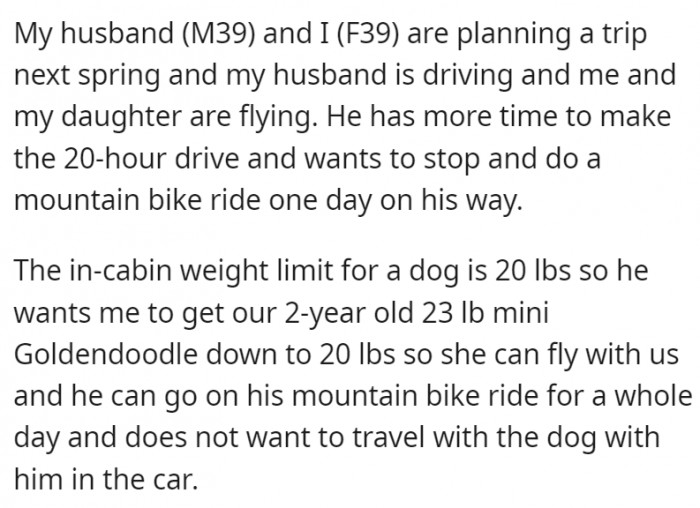
However, OP doesn't want to restrict their dog's food any further since she has already cut it back a bit before.
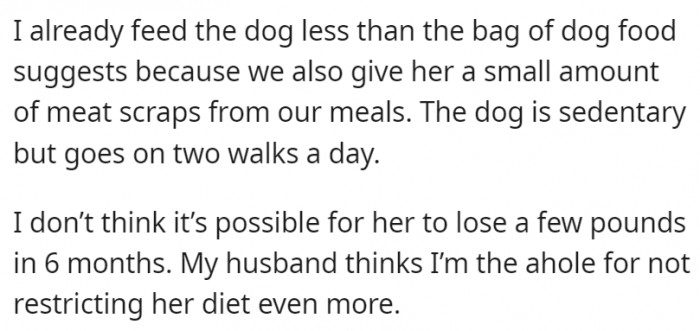
The Complexity of Pet Weight Management
The dilemma surrounding a pet's weight limit for air travel highlights the complexities of pet care and responsibility. Research in veterinary psychology indicates that pet owners often face emotional dilemmas when balancing their affection for their pets with practical care needs. In this case, the woman's reluctance to restrict her dog's weight may stem from a deep attachment, compounded by feelings of guilt associated with pet care.
This emotional conflict can lead to challenging decision-making regarding a pet's health and well-being.
According to various sources on the internet, the average mini Goldendoodle weighs between 26 and 35 lbs. Other sources suggest that their normal weight typically ranges from 15 to 30 lbs.
Either way, it seems that their dog is already at a healthy weight, and further dieting would put it on the lighter side for its size and breed. While it may not immediately affect the dog negatively, it seems that dieting it just so it can fly doesn't appear to be a completely valid reason to do so.
Many people in the comments section also share this sentiment. Here are the top comments.
1. The only reason dogs should be losing weight is if it's a concern for their health.
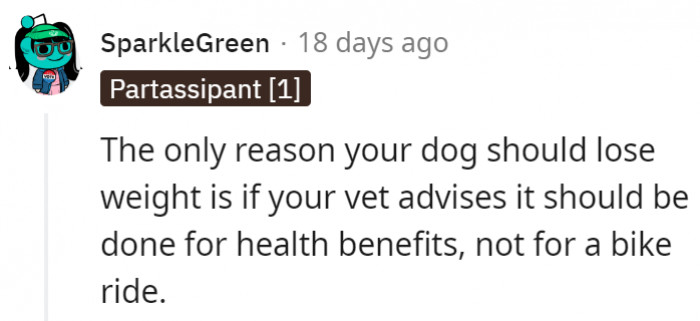
2. How about the husband tries it and sees how he likes it?
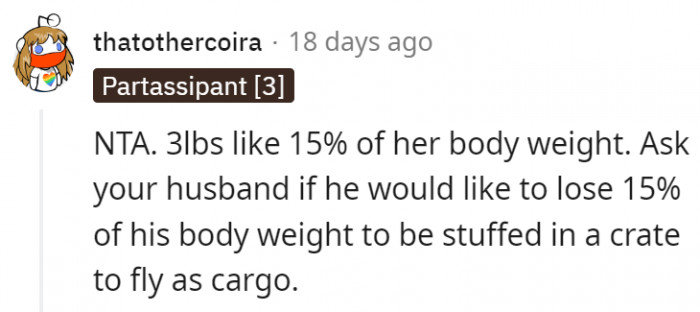
3. No one but the vet should determine whether your pet needs to lose a few pounds.
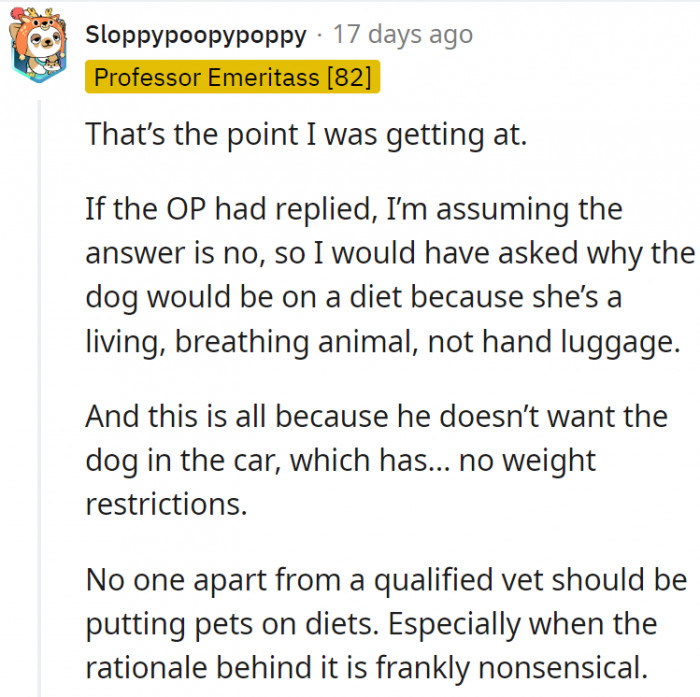
Moreover, the concept of cognitive dissonance may play a role in this scenario. Cognitive dissonance occurs when individuals experience discomfort from holding conflicting beliefs or attitudes. The woman may feel torn between her desire to keep her pet healthy and her emotional attachment, leading to stress and indecision. Understanding this psychological phenomenon can help pet owners navigate their feelings more effectively.
Research suggests that awareness of cognitive dissonance can lead to more informed decision-making regarding pet care.
4. No dog should be put on a diet just for convenience.

5. If your dog isn't overweight, then there's no need to lose weight. Simple logic.
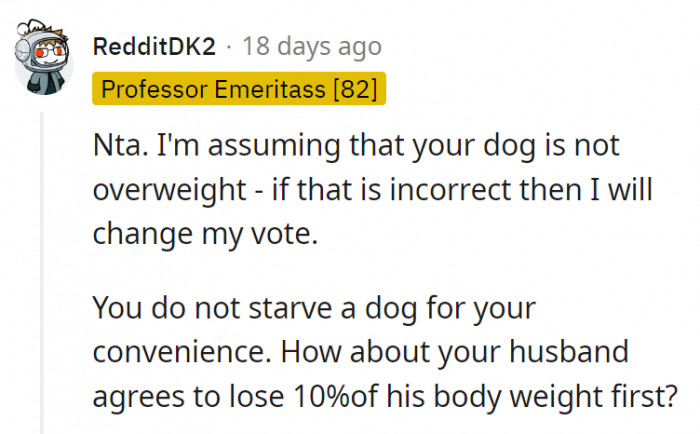
6. Talk to the vet first.

Promoting Healthy Pet Care Practices
Promoting healthy weight management practices is essential for pet owners, especially when traveling. Veterinary studies emphasize the importance of regular check-ups and consultations to ensure pets maintain a healthy weight. Encouraging the woman to consult with a veterinarian about her dog's weight can empower her with knowledge and practical strategies to manage her pet's health.
Additionally, developing a structured feeding and exercise routine can help ensure her pet remains healthy while addressing travel concerns.
7. The simplest solution for them would be for the husband to take the dog along with him.
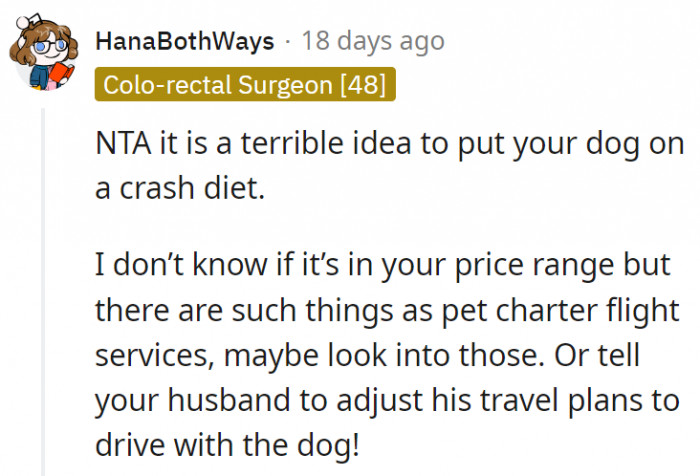
8. A dog's weight is not something to be trifled with.
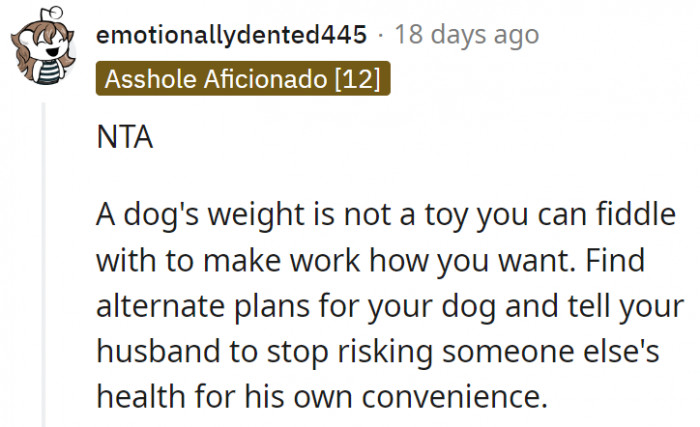
9. Forcing a dog to diet just so it can fly on the plane is not a good enough reason.
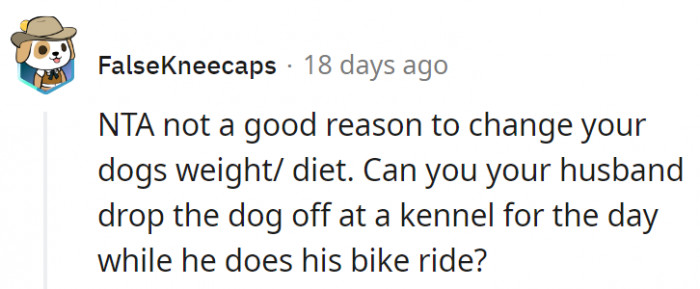
Encouraging open dialogue between pet owners and veterinarians is crucial for effective pet management. Research indicates that collaborative conversations can lead to better health outcomes for pets. By discussing her concerns openly with her veterinarian, the woman can find a balance between her emotional attachment and her pet's health needs.
Utilizing resources like pet health workshops can also provide valuable information and support for pet owners trying to navigate these challenges.
10. It's unfair for both parties, but it's also unfair for the dog.
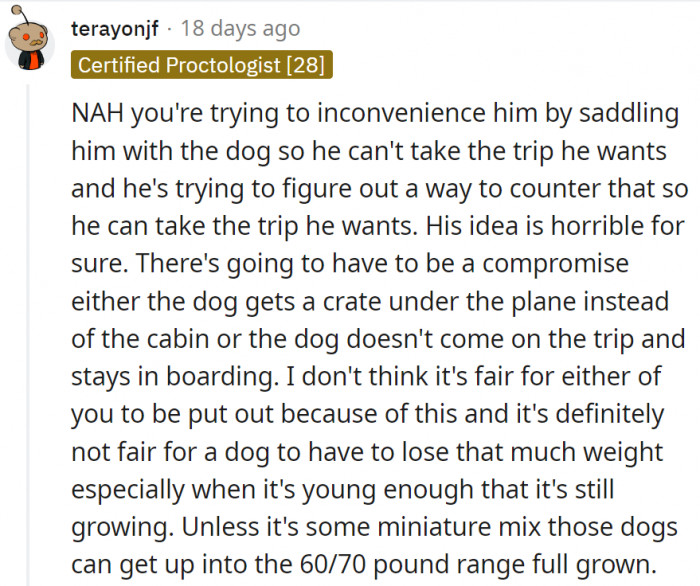
11. Maybe those extra 3 lbs wouldn't matter as much.
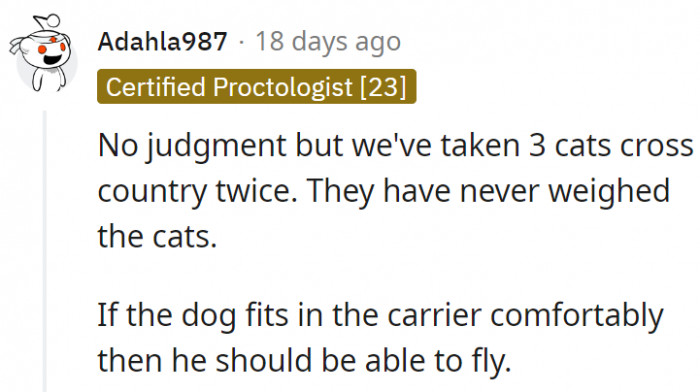
12. They'd need a better reason.
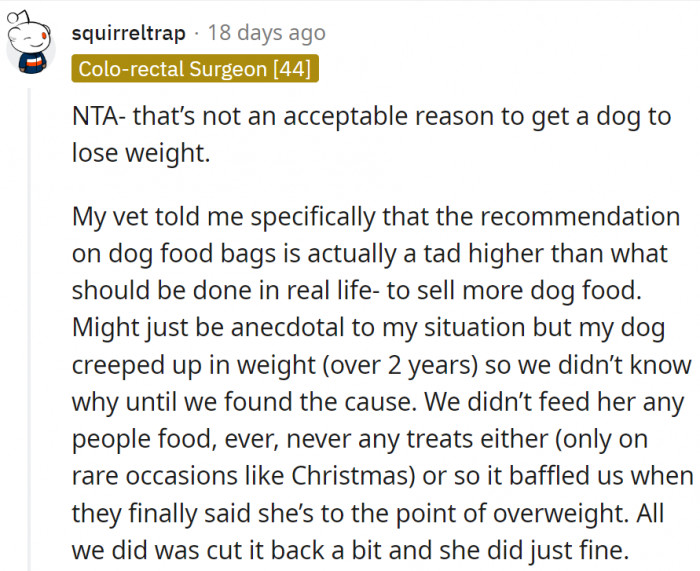
13. Some people think the husband is just being selfish.
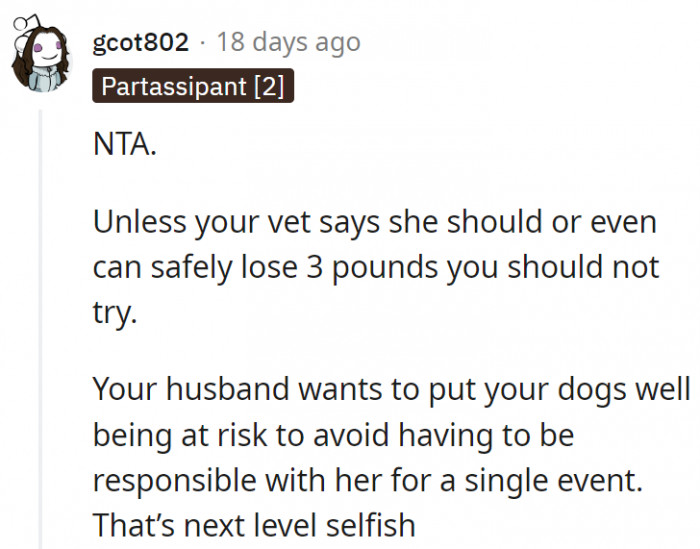
14. It should be pointed out to the husband that 3 lbs is 13% of the dog's weight.
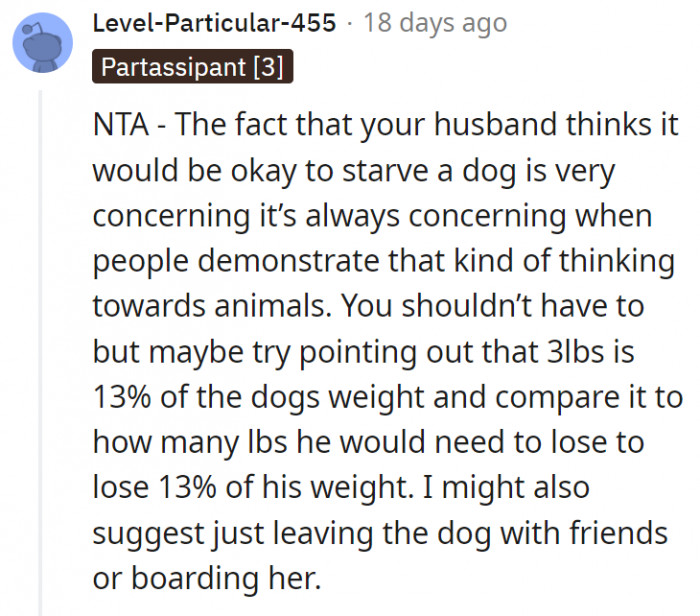
15. When it comes to dogs, vets know best.
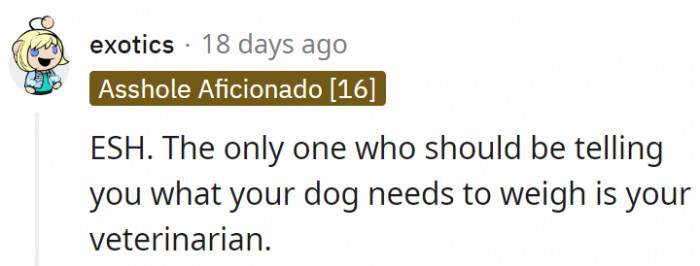
16. The husband might need to rethink his position.

17. Training the dog to go along on mountain bike rides or putting it in daycare are also other options.

18. The man really wants the solo time to bike ride.
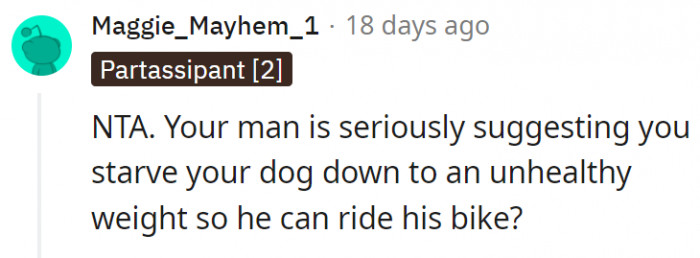
19. Maybe air security won't be too strict.
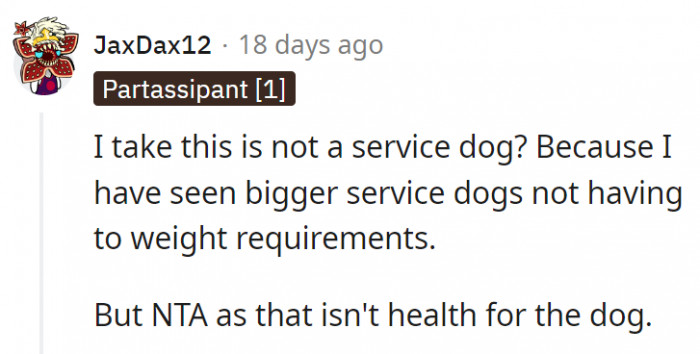
20. Any kind of pet weight loss should be supervised by a vet.
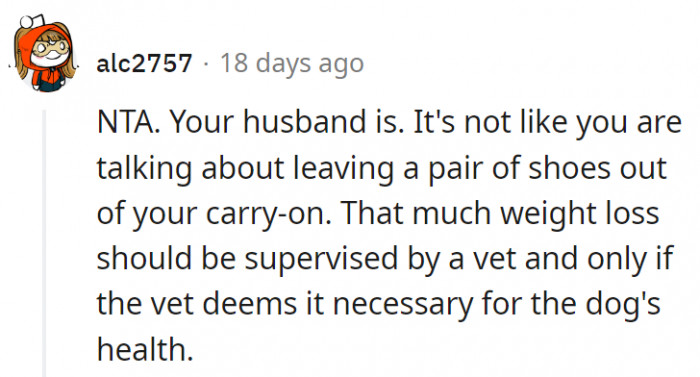
Before OP or her husband puts their dog on a diet, it seems prudent for them to consult a vet first to determine if it's healthy for the dog, especially given their reason for the dog's weight loss. They could also explore other options for their dog if losing weight isn't feasible.
Either way, it would be wise for them to consider other options before taking any rash actions that could risk their pup's health. What do you think?
Psychological Analysis
This situation illustrates the emotional challenges many pet owners face when making decisions about their pets' health. The woman's reluctance to limit her dog's weight may reflect deeper attachment issues that complicate her decision-making. It's vital for pet owners to seek guidance and communicate openly about their concerns to foster healthier relationships with their pets.
Analysis generated by AI
Analysis & Alternative Approaches
Understanding the emotional complexities of pet care can aid owners in making informed decisions about their pets' health. By promoting open dialogue and healthy management practices, pet owners can navigate these dilemmas more effectively. Research highlights the importance of addressing emotional needs while ensuring the well-being of pets.



